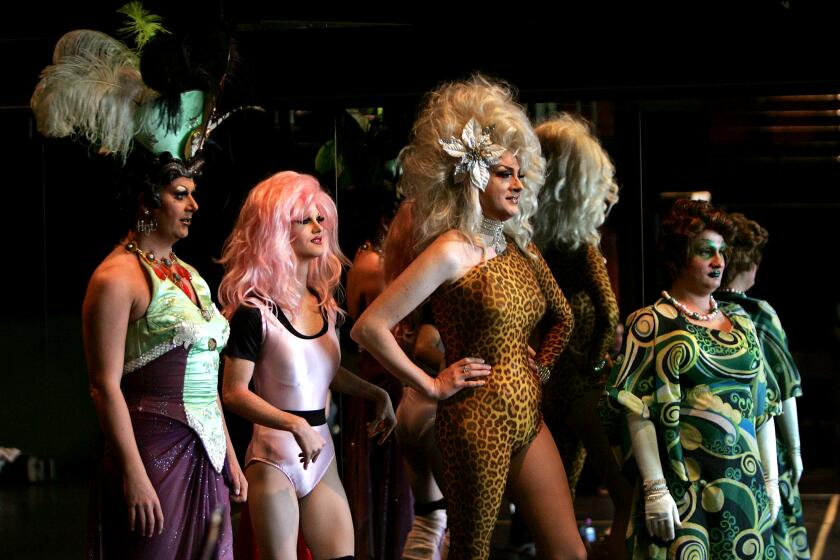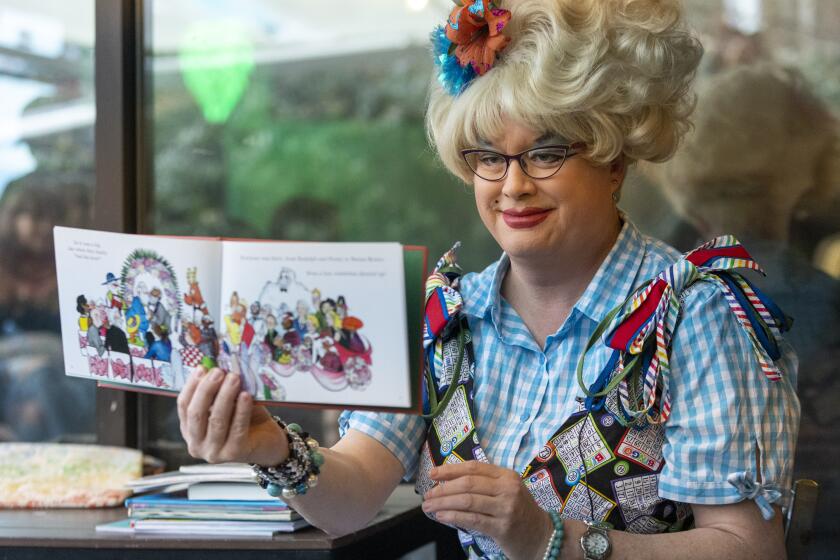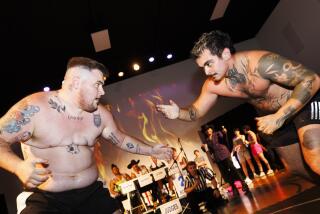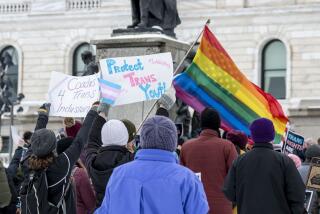Opinion: My 12-year-old trans friend came to my drag pageant. But for her, gender is not a costume
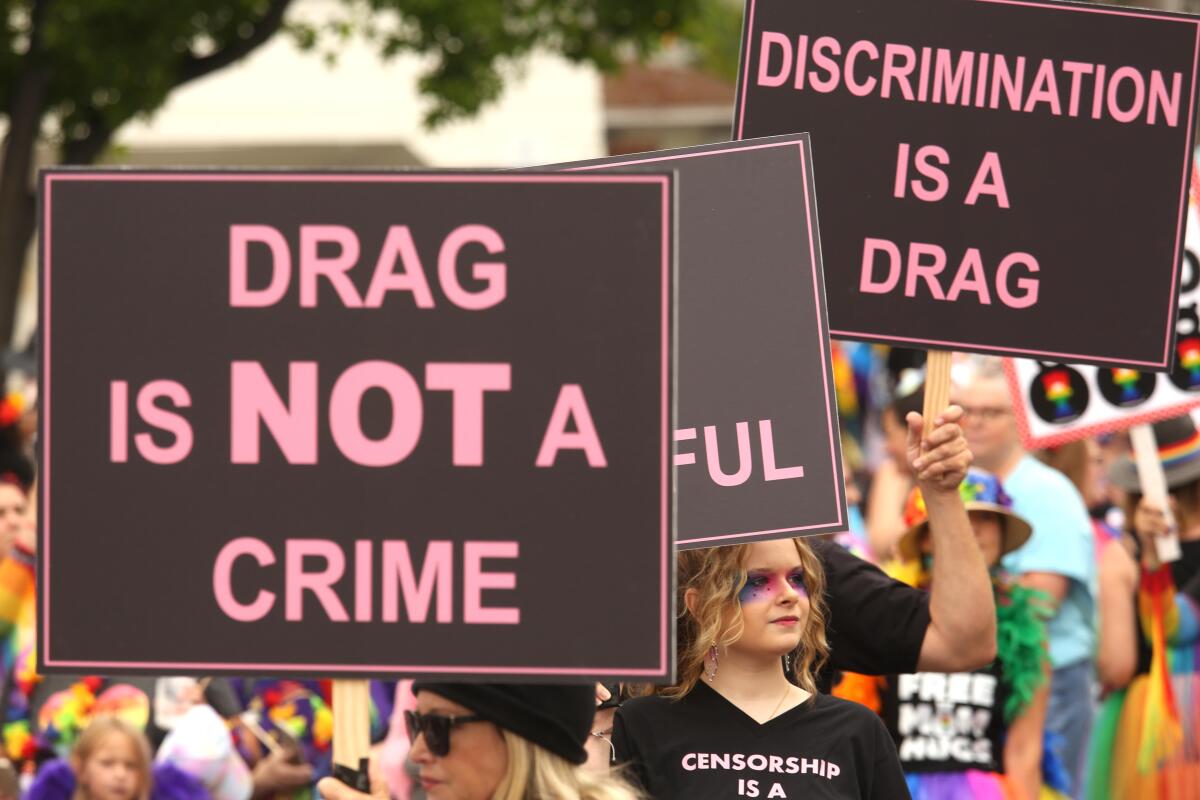
About a month ago, I was crowned the first Mx. Pride St. Louis, winning my first title in drag. The most memorable part of this experience for me was seeing Q., a 12-year-old trans girl in the audience.
I’ve been in Q.’s life since she was 6, supporting her through her parents’ split, a move to rural Missouri and a confusing — and often tumultuous — exploration of her gender. When I first started performing drag, I invited Q. to peruse my drag wardrobe, and she expressed admiration over a colorful blazer. A few weeks later, I gave it to her for Christmas. She wore it for her seventh-grade school pictures.
One of the things Q. and I have in common is that we move through the world visibly queer and we occupy the liminal, in-between space of gender expansiveness. Onstage, I stuff packers in my underwear and bind my chest. In my everyday life, I mostly present femme, with certain masculine traits such as thick facial and body hair.
Tucker Carlson was outraged that my stepdad took me, a 16-year-old, to see Miss Conception. The show was billed as family entertainment — and it was.
It’s never felt particularly important for me to declare my gender the way I did my sexuality when I first started dating women. “Queer,” to me, covers my whole identity, and I don’t experience the kind of dysphoria that requires medical intervention for me to feel authentic and whole.
But I understand why, at 12, Q. doesn’t have the same luxury. She is working with a speech therapist to fight the natural deepening of her voice and she would start taking hormone blockers if she was out to her father. But at the transgender center at St. Louis Children’s Hospital — the only pediatric endocrinologist Q.’s mom has access to — consent from both parents is required to receive this type of gender-affirming care.
Q. is also not out to her grandmother or her brother, who mostly lives in another state with his very devout father and stepmother. Q. has privately celebrated legislative victories for LBGTQ+ people, and she has mourned the many bills passing through Missouri’s government that put queer kids and adults in danger. She is remarkably tuned in to the national conversation and the ways the adults in her life are either fighting loudly for her right to exist, or are silent, or worse. Her mother teaches her how to use mascara and nail polish and takes her to salons to wax the hair on her upper lip, yet it’s not safe for her to fully emerge.
Q.’s mom taught me how to sew when I was preparing for my drag pageant. As we worked with the hoop skirt and glittery tulle, Q. drew quietly in her sketchbook. The design on one of my costumes involved sewing strips of fabric into a pride flag. “What is the order of the colors again?” Q.’s mom asked me.
Q. rushed to her bedroom, emerging a minute later with a pride flag that had been hanging on her wall. “For reference,” she said, draping the flag so that we could see it as we worked.
Whipping up moral panic about drag queen story hours at libraries is part of a broader war on LGBTQ lives.
Before I left that day, I asked Q. if she was coming to the pageant, and her eyes lit up. “Am I allowed?” she asked, looking incredulously at her mom for confirmation.
“There’s no age restriction,” I said. “You should come.”
A few weeks later, at the pageant, I scanned the crowd from behind the stage curtain. Q. was wearing the bright blazer I had given her and sitting beside her mom, mouth agape. “Q. didn’t pick up her phone a single time for the four-hour pageant,” her mom later told me. “That’s a big deal.”
Back home, with my sash displayed neatly in my living room, I texted Q. to hear what she thought of the pageant. She talked about the cool costumes and the overwhelming queerness of it all. Then, she texted, “I just felt at home.”
I often think about the difference it would have made for me, in my acceptance of myself as queer, if there had been someone in my life the way I hope I am in Q.’s. I also worry I am not doing enough, or that she will come to resent the way drag parodies and satirizes gender. Gender is not a costume for Q., nor a persona she can slip into on Friday nights to make a little cash. Or maybe it is. Maybe the message I saw on a sign at my last trans rights rally is right: All gender is drag.
Gabe Montesanti is the author of the book “Brace for Impact” and is writing a memoir about drag. @GabeMontesantiAuthor
More to Read
A cure for the common opinion
Get thought-provoking perspectives with our weekly newsletter.
You may occasionally receive promotional content from the Los Angeles Times.
